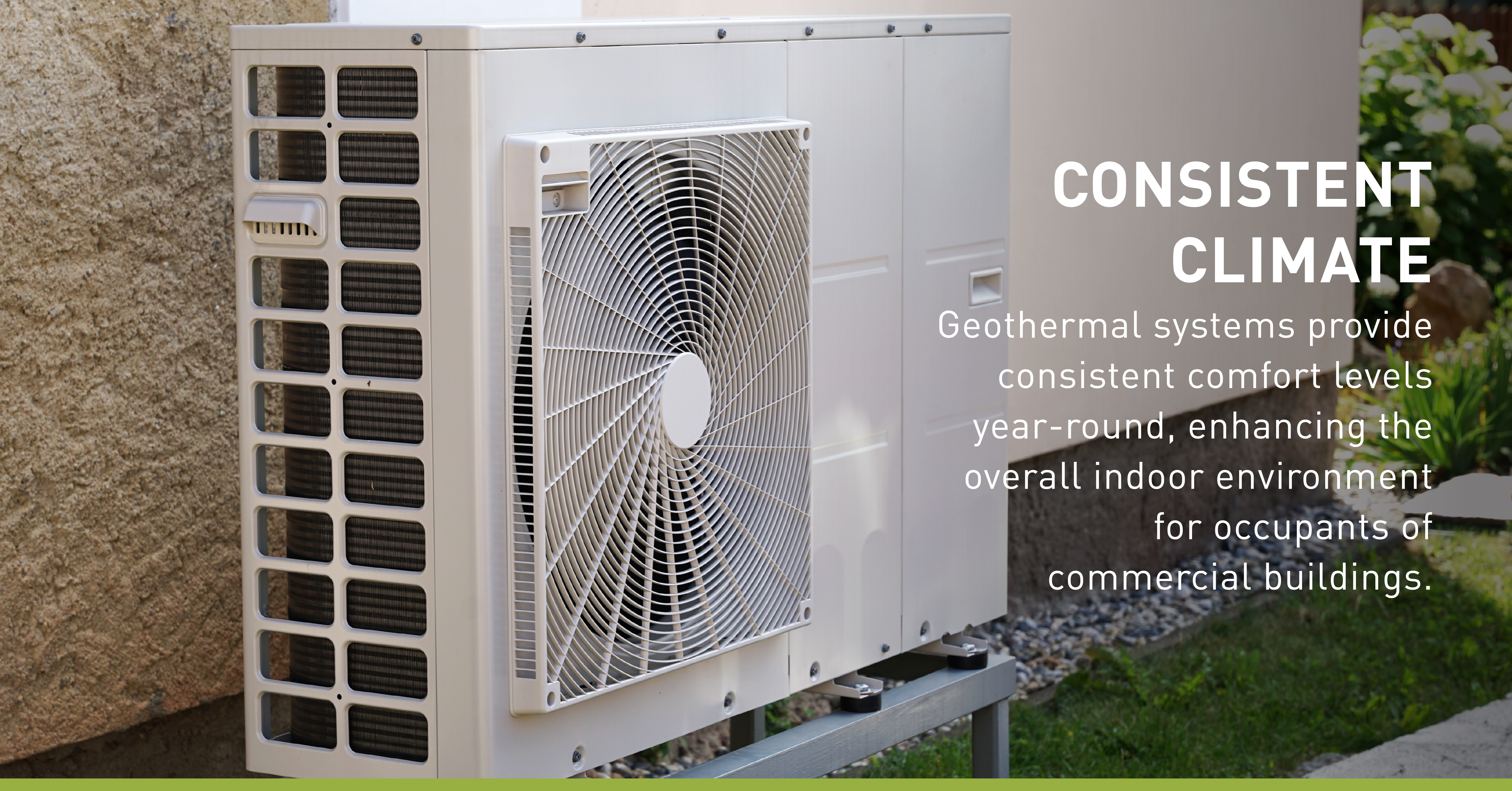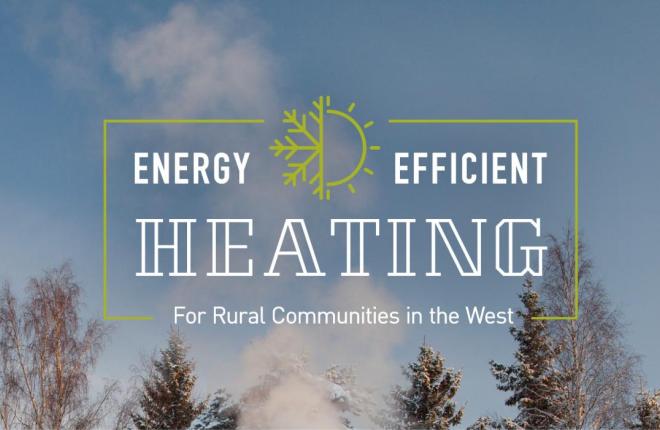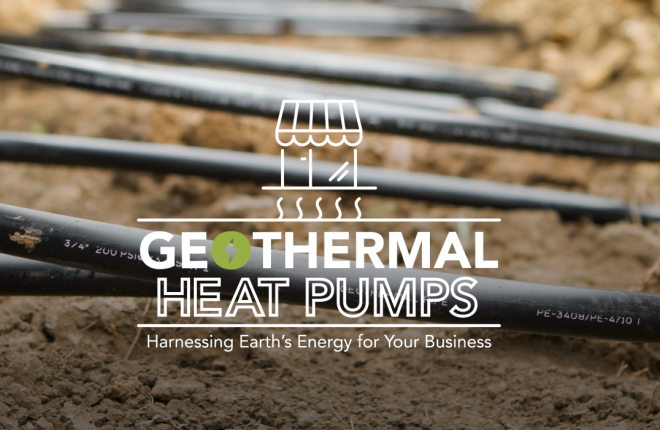
4/23/2024
Geothermal Heat Pumps: Harnessing Earth's Energy for Your Business
As we navigate the landscape of sustainable energy solutions, one technology stands out for its efficiency and environmental benefits: geothermal heat pumps (GHPs). Especially for larger commercial buildings, GHPs offer a compelling alternative to traditional heating and cooling systems. With April being National Geothermal Month, it’s a perfect time to delve into the process of installing GHPs, their benefits, what climates are the most suitable and how businesses can take advantage of rebates to offset costs while contributing to a greener future.
The Installation Process
Installing a geothermal heat pump involves harnessing stable temperatures below the earth's surface to provide heating, cooling, and hot water for buildings. Unlike air-source heat pumps, which rely on external air temperatures, GHPs tap into the consistent thermal energy stored in the ground. This process involves drilling boreholes or installing horizontal loops underground to circulate a heat exchange fluid, transferring heat to or from the ground, depending on the season. This proven technology is probably already being used in your household as refrigerators operate on a similar system.
For larger commercial buildings, the installation process may require more extensive drilling or looping systems to accommodate higher heating and cooling demands. However, the long-term benefits of GHPs often outweigh the initial investment, especially for buildings with substantial energy needs.

Benefits for Business Owners
There are numerous advantages of GHPs for commercial buildings:
Improved Efficiency: Compared to traditional heating systems fueled by gas or propane, GHPs offer superior efficiency, leading to reduced energy consumption and lower utility bills.
Reduced Greenhouse Gas Emissions: By relying on renewable geothermal energy, GHPs significantly decrease greenhouse gas emissions, aligning with climate goals and sustainability initiatives.
Consistent Performance: GHPs provide consistent heating and cooling year-round, regardless of external weather conditions, ensuring optimal comfort for building occupants.
Long-Term Savings: Despite higher upfront costs, GHPs offer substantial long-term savings through reduced energy expenses and lower maintenance requirements.
Environmental Stewardship: Choosing GHPs demonstrates a commitment to environmental stewardship, enhancing the reputation of your business as a responsible corporate citizen.

Climates Suitable for GHPs
While the technology around geothermal heat pumps is captivating on its own, you might wonder if they are suitable for your property on the plains, in urban areas, or in the mountains.
A recent report from SWEEP evaluated geothermal heat pump performance in several climate zones in Colorado and the findings were promising when it came to potential energy savings. Colorado experiences significant temperature fluctuations throughout the year, with cold winters and hot summers being the norm. Geothermal heat pumps leverage the stable temperature of the earth below the surface to provide efficient heating and cooling, making them exceptionally well-suited for Colorado's climate and the surrounding states, particularly New Mexico and Wyoming.
During the winter months, when temperatures plummet, geothermal heat pumps extract heat from the warmer ground and transfer it into the building, ensuring consistent and reliable heating even in the coldest conditions. This process is highly efficient and can significantly reduce energy consumption compared to traditional heating systems, thereby lowering operational costs for commercial properties.
Similarly, in the summer, geothermal heat pumps reverse their operation, extracting heat from the building and dissipating it into the cooler ground below. This process effectively cools the building without the need for energy-intensive air conditioning systems, offering substantial energy savings, and reducing greenhouse gas emissions.
Moreover, geothermal systems provide consistent comfort levels year-round, enhancing the overall indoor environment for occupants of commercial buildings. Given these benefits, geothermal heat pumps represent a sustainable and cost-effective solution for commercial properties in Colorado and the surrounding states, aligning with the state's commitment to environmental stewardship and energy efficiency.
Driving Expansion and Innovation
Expanding the adoption of GHPs in larger commercial buildings requires collaboration and leadership across various sectors such as:
Industry Collaboration: Working closely with GHP businesses, real estate professionals, and policymakers, we can drive awareness and adoption of GHPs in the commercial sector.
Investment in Infrastructure: Investing in the expansion of commercial drilling and looping capacity is essential to meeting the growing demand for GHP installations in larger buildings.
Performance Assurance: Implementing processes for independent design review and post-installation performance testing ensures the efficacy and reliability of GHP systems in commercial applications.
Navigating Rebates and Incentives
To encourage the adoption of GHPs, various rebates and incentives are available for businesses:
Federal and State Tax Credits: Businesses can take advantage of federal and state tax credits designed to offset the upfront costs of installing GHP systems. These credits can be combined and, in some cases, cover over 50% of installed costs.
Utility Rebates: Many electric utility cooperatives, including Tri-State, offer rebates for installing energy-efficient technologies like GHPs, further reducing the financial burden for businesses.
State Grant Programs: Colorado's Geothermal Energy Grant Program provides funding specifically for GHP projects in public schools, government buildings, nonprofit medical facilities, and new residential or commercial developments.
By leveraging these incentives, businesses can significantly reduce the initial investment required for GHP installation, making it a more financially viable option.
Conclusion
Geothermal heat pumps represent a transformative solution for heating and cooling larger commercial buildings, offering unparalleled efficiency, environmental benefits, and long-term savings. By seizing available rebates and incentives, businesses can offset initial expenses while contributing to a sustainable future. Together, let's harness the power of geothermal energy to create a greener, more resilient tomorrow.
Ready to get started? To learn more about whether geothermal is right for you, the International Ground Source Heat Pump Association has a list of qualified contractors that can be searched by location. If you cannot find someone listed in your area, reach out to your local electric utility or email info@igshpa.org.
--
About Tri-State
Tri-State is a power supply cooperative, operating on a not-for-profit basis, serving electric distribution cooperatives and public power district member-owners in four states. Together with our members, we deliver reliable, affordable and responsible power to more than a million electricity consumers across nearly 200,000 square miles of the West. Visit www.tristate.coop.
Blog Posts

Protecting Your Home Year-Round from Wildfires

Summer Backpacking: Solar Power, Energy Efficiency, and the Best States to Visit

Beat the Chill: Effective Insulation Strategies for Winter Comfort

Energy Efficient Heating Options for Rural Communities in the West

Boost Your Business with EV Charging

The Benefits of Having Your Own EV Charger at Home

Geothermal Heat Pumps: Harnessing Earth's Energy for Your Business

Mastering Energy Efficiency with These Home Upgrades

